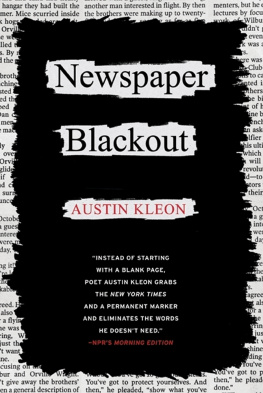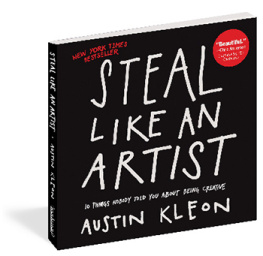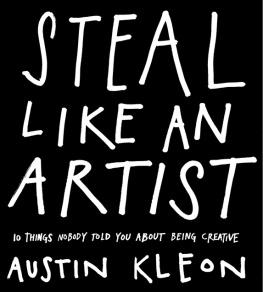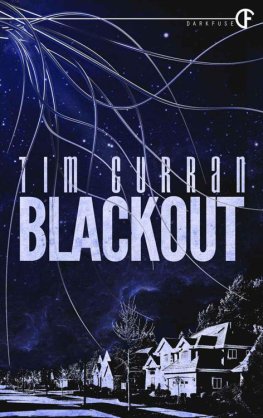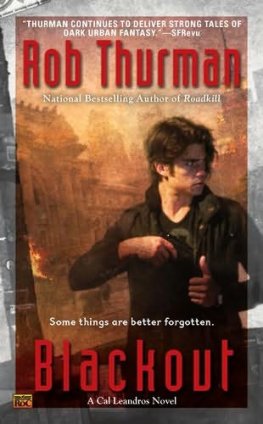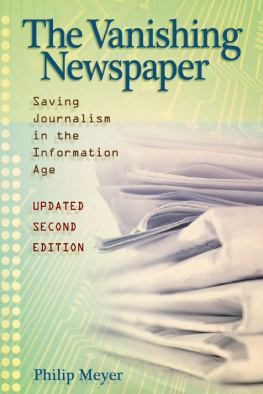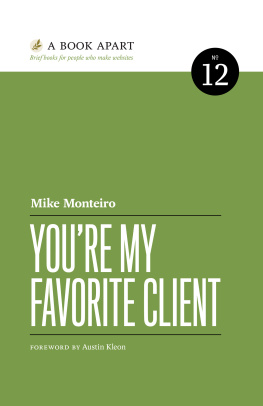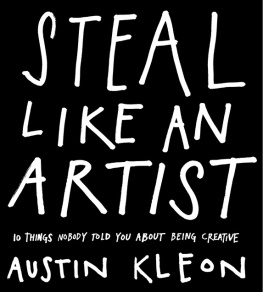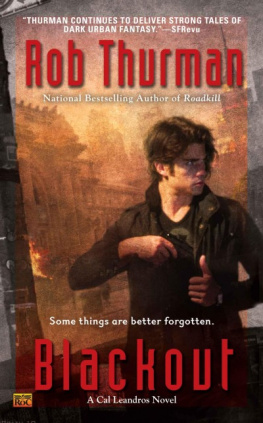Kleon - Newspaper Blackout
Here you can read online Kleon - Newspaper Blackout full text of the book (entire story) in english for free. Download pdf and epub, get meaning, cover and reviews about this ebook. year: 2014, publisher: HarperCollins;Harper Perennial, genre: Home and family. Description of the work, (preface) as well as reviews are available. Best literature library LitArk.com created for fans of good reading and offers a wide selection of genres:
Romance novel
Science fiction
Adventure
Detective
Science
History
Home and family
Prose
Art
Politics
Computer
Non-fiction
Religion
Business
Children
Humor
Choose a favorite category and find really read worthwhile books. Enjoy immersion in the world of imagination, feel the emotions of the characters or learn something new for yourself, make an fascinating discovery.
- Book:Newspaper Blackout
- Author:
- Publisher:HarperCollins;Harper Perennial
- Genre:
- Year:2014
- Rating:5 / 5
- Favourites:Add to favourites
- Your mark:
- 100
- 1
- 2
- 3
- 4
- 5
Newspaper Blackout: summary, description and annotation
We offer to read an annotation, description, summary or preface (depends on what the author of the book "Newspaper Blackout" wrote himself). If you haven't found the necessary information about the book — write in the comments, we will try to find it.
Kleon: author's other books
Who wrote Newspaper Blackout? Find out the surname, the name of the author of the book and a list of all author's works by series.
Newspaper Blackout — read online for free the complete book (whole text) full work
Below is the text of the book, divided by pages. System saving the place of the last page read, allows you to conveniently read the book "Newspaper Blackout" online for free, without having to search again every time where you left off. Put a bookmark, and you can go to the page where you finished reading at any time.
Font size:
Interval:
Bookmark:

To my wife, Meghan
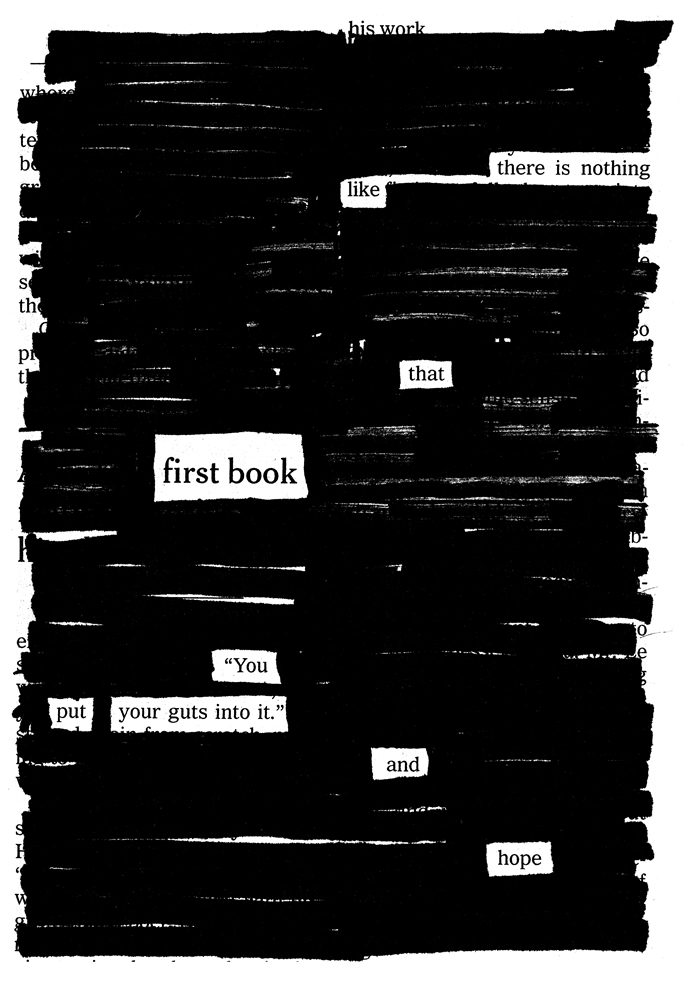
The poems in this book exist thanks to petty crime, writers block, and the Internet.
Four years ago, my girlfriend, Meg, was working in a crummy neighborhood in Cleveland, Ohio, and some lowlife thief was stealing the daily newspapers off the office steps. Meg convinced her boss to have the papers delivered to our apartment in a less-crummy neighborhood, where the bandit couldnt get to them. The papers arrived on our doorstep every morning unharmed, and every morning Meg would clip out her industry news to bring with her to work, stacking what remained of the papers in a huge pile beside my desk before heading off.
I was twenty-two at the time, barely out of undergrad, and trying desperately to be a short story writer. Short stories are what they teach you to write in college, and so I tried to write them. But without the structure of academia with homework assignments and writing workshops, I felt lost. I struggled through handbooks of writing exercises. Nothing worked. Each blink of the Microsoft Word cursor taunted me.
Writing wasnt fun anymore.
One day, I looked over at that stack of newspapers left by Meg next to my desk. I might have had no words, but there, right beside me, were millions of them.
So, fed up with my short story attempts and failures, I picked up a permanent marker and the Metro section and started blacking out words, leaving a choice few uncovered. I didnt know what I was doing, or why. All I knew was that it was fun to watch those words disappear behind that fat black marker line. It didnt feel like work, it felt like play.
Thats the entire origin story I have to give you. Ive since become suspicious of any artists who claim they knew exactly what they were doing when inspiration struck. The truth is, in the words of Donald Barthelme, art is about not-knowing. Its when youre bored and frustrated and just looking to have some fun that the good ideas come.
The pile of newspapers turned into pieces of blackened newsprint reeking of marker fumes. They werent just writing exercises, they were little finished objects. They were short, they made use of the page, they had concentrated language. Id never wanted to be a poet, but dang, if they werent poems.
I called them Newspaper Blackout Poems, and I began posting them to my blog.
Time passed. People began to take notice. Id get e-mails and links from other blogs. The more people showed interest, the more poems Id post. Much to my surprise, my little poems were creating some big noise around the Internet and in papers around the country. Eventually they made it all the way to a feature story on NPRs Morning Edition.
In the four years since I made that first blackout poem to the time of this books publication, my girlfriend became my wife and we moved miles across the country to Austin, Texas. The following poems were created from June to December 2008. Most were composed on the bus to my day job, during my lunch break in the basement of the building where I work, and on the bus ride home.
Whats exciting about the poems is that by destroying writing you can create new writing. You can take a strangers random words and pick and choose from them to express your own personal vision.
Writing should be fun. Everyone can do it. I hope this book inspires you to try to create your own blackout poems. Theyre a fun, constructive way to pass time. They cost next to nothing to make. All you need is yesterdays newspaper and something that marks. Ive included a section at the end of the book to get you started.
Thanks for reading. If you like what you read, head over to www.austin
kleon.com for more.
And if we see each other on the bus with our markers and newspapers, lets be sure to wave hello.
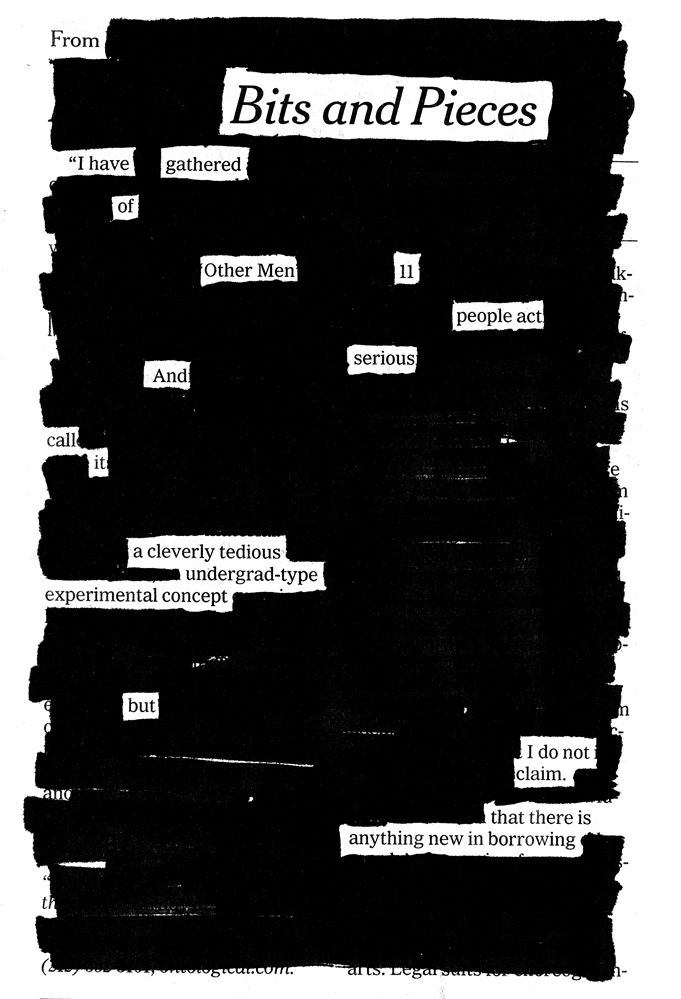
When I first put marker to newsprint, I was ignorant of any artistic or poetic precedent.
As a teenager, Id seen images of John Lennons declassified FBI files on The Smoking Gun Web sitegrainy photocopies of typed agent reports heavily redacted with strokes of black Magic Marker. I printed them out and pasted them in my notebook.
Ten years later, I was posting poems to my blog that looked very much like those files.
I thought I was ripping off the government!
But after a handful of e-mails, blog comments, and message board flames (1970 called, and Tom Phillips wants his idea back! Lame William Burroughs rip-off), I decided to set out to do a little bit of research as to what might have come before.
As it turns out, theres a 250-year-old history of folks finding poetry in the daily newspaper.
It all begins in the 1760s. Caleb Whitefoord, an English wine merchant, writer, diplomat, and former next-door neighbor of Benjamin Franklin, is living in the country about forty miles outside of London, shut in from bad weather, with only a deck of cards and a few newspapers to amuse himself. He sees no reason why newspapersa jumble of unconnected occurrencescant be as entertaining as a deck of cards, and so, after he reads the tightly columned newspaper in the old trite vulgar way, i.e. each column by itself downwards he next reads two columns across.
This method of blind chance brings about the strangest connections... things so opposite in their nature and qualities, that no man alive would ever have thought of joining them together.
He writes down the best combinations and publishes them under the name cross-readings. Here are a handful:
This day his Majefty will go in state to
sixteen notorious common prostitutes.
On Tuesday both Houses of Convocation met:
Books shut, nothing done.
Wanted, to take care of an elderly gentlewoman,
An active young man, just come out of the country.
To be Iett, and entered on immediately,
A young woman, that will put her hand to any thing
Theyre a big hit with his peers and fellow writers, one of whom says he laughed till he cried while reading them.
Fifty years later, our nations third president, a man by the name of Thomas Jefferson, decides he digs the teachings of Jesus, but finds all the miracles and supernatural elements of the Gospels a bit ridiculous. So he takes scissors to his King James Bible, cuts out only the parts he likes, and pastes them in a scrapbook. He calls it The Life and Morals of Jesus of Nazareth. It later becomes known as The Jefferson Bible.
Cut to a surrealist rally in Paris in the 1920s. A Romanian poet named Tristan Tzara proposes to create a poem by pulling words out of a hat. A riot ensues, and the surrealists decide to kick Tzara out of their club. He outlines the method in his Dada Manifesto on Feeble & Bitter Love:
Take a newspaper. Take some scissors. Choose from this paper an article the length you want to make your poem. Cut out the article. Next carefully cut out each of the words that make up this article and put them all in a bag. Shake gently. Next take out each cutting one after the other. Copy conscientiously in the order in which they left the bag. The poem will resemble you. And there you arean infinitely original author of charming sensibility, even though unappreciated by the vulgar herd.
Font size:
Interval:
Bookmark:
Similar books «Newspaper Blackout»
Look at similar books to Newspaper Blackout. We have selected literature similar in name and meaning in the hope of providing readers with more options to find new, interesting, not yet read works.
Discussion, reviews of the book Newspaper Blackout and just readers' own opinions. Leave your comments, write what you think about the work, its meaning or the main characters. Specify what exactly you liked and what you didn't like, and why you think so.

